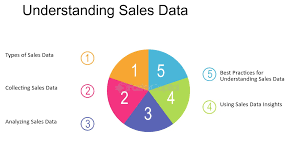Harnessing Sales Data for Better Insights and Rapid Deal Closure
Sales data is a critical asset for gaining insights and closing deals swiftly. With the ever-expanding data footprint, including customer response rates, leads in the pipeline, and quota attainment, tracking these metrics is essential. Ignoring them can be detrimental, as nearly all sales professionals recognize the importance of real-time data in meeting customer expectations, according to the Trends in Data and Analytics for Sales Report.
However, concerns about data setup for generative AI and data accuracy persist. Sixty-three percent of sales professionals report that their company’s data isn’t optimized for AI, and only 42% are confident in their data’s accuracy. The demand for sales data has become a focal point for sales leaders and representatives, who increasingly rely on data to enhance customer engagement and productivity through trusted sources and AI integration.
What is Sales Data?
Sales data encompasses two main categories: external data, which includes information about prospects such as demographics, interests, behavior, and engagement; and internal sales data, including deal attributes and sales performance metrics. This data helps inform deal actions, assess progress toward sales targets or key performance indicators (KPIs), and supports tools like AI to enhance efficiency.
Why is Sales Data Important?
Sales data provides a measurable framework for all sales activities, enabling the setting of performance benchmarks and targets. It helps identify risks in the pipeline and highlights opportunities for upselling or fostering competition among sales reps. The data is also crucial for leveraging generative AI, which can automate tasks such as email drafting and sales pitch creation, provided the data is accurate and well-organized.
Types of Sales Data
- Demographic Data: Fundamental customer attributes such as name, age, gender, role, location, and contact information, essential for building buyer personas and targeting marketing efforts.
- Firmographic Data: Company-specific information, including name, location, size, industry, and revenue, which helps target prospecting and marketing.
- Technographic Data: Information about the technologies and tools used by target buyers, assisting in identifying functional gaps and offering aligned solutions.
- Chronographic Data: Details financial and operational changes within businesses, such as new hires, funding rounds, and acquisitions, providing opportunities for prospecting and engagement.
- Intent and Behavior Data: Insights into the content consumption habits and product interests of target buyers, aiding in strategic decision-making.
- Deal Data: Information gathered during the sales process about desired products or services, pricing, and competitor comparisons.
- Internal Sales Performance Data: Metrics on sales team effectiveness, such as deal close rates and sales cycle lengths, used to identify areas for improvement or reward high performance.
Collecting and Utilizing Sales Data
To effectively collect and utilize sales data, invest in a CRM system that serves as a centralized data repository with analytics capabilities. Automate data collection within the CRM, integrate data from other tools, and prioritize the security of sensitive information. Visualizing data through dashboards can help track progress toward business goals and make informed decisions.
Real-Life Application: A Case Study
A global consulting firm used sales data to enhance win rates and accelerate deal velocity. By integrating CRM analytics with data from various sources, the firm identified key deal attributes impacting success and adjusted strategies accordingly. The use of AI-driven “opportunity scores” further enabled the firm to monitor deal health and optimize resource allocation.
Essential Tools for Harnessing Sales Data
- CRM Software: An intuitive CRM with automation and security features to consolidate customer interactions and protect sensitive data.
- Sales Analytics and Reporting Tools: Platforms that offer real-time status updates on KPIs and business goals, with AI capabilities for actionable insights.
Turning Sales Data into Actionable Insights
Regularly reviewing CRM-generated insights and adjusting strategies based on these insights is crucial for closing more deals and delivering consistent value to customers. By focusing on data-driven decision-making, sales teams can stay competitive and meet evolving customer needs.
🔔🔔 Follow us on LinkedIn 🔔🔔










